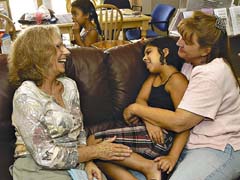Group helps families cope with fetal alcohol syndrome
GABRIELLE FIMBRES
Tucson CitizenJuly 29, 2008
Click here to view slide showClick here to read related story. Staci Thacker has a vision of her granddaughter as a happy, successful college student.
But the road won't be easy. Tatiana Filkin, 10, has brain damage caused by prenatal exposure to alcohol, Thacker says.
"College will be a real challenge for her,'' Teresa Kellerman tells Thacker, who has become like a mom to the child, who needs special education services.
"She may not graduate. But she's going to make it because she's got a good mom,'' Kellerman says of Thacker.
Kellerman, who runs the Fetal Alcohol Resource Center, talked to Thacker during a monthly support group meeting for families at the center, 4710 E. 29th St., Building 7.
Kellerman, 61, is the adoptive mother of John, 31, who has fetal alcohol syndrome, also called FAS. She founded the center in 1998 with money she won playing the lottery.
Kellerman also provides support and information about the preventable disorder for families in Tucson and around the world through her Web site, www.fasarizona.com.
Families come together at support group to talk about their challenges and successes in raising children with fetal alcohol spectrum disorders, aka FASD, which occur when a pregnant woman consumes alcohol.
The damage leaves children with permanent learning disabilities plus social and emotional problems.
Alcohol does more damage to a developing brain than any other substance of abuse, including heroin, cocaine and marijuana, according to the Institute of Medicine.
The support group offers a safe place where families can get help.
"This is where parents can come and cry and laugh,'' Kellerman says. "Nobody's going to judge anybody.''
Thacker, along with her husband, Brian, has had guardianship of her granddaughter since Tatiana was 3. Thacker says the support group helps her family understand FASD.
"You would never guess that there's anything wrong with her by looking at her,'' Thacker says of Tatiana. "But she's developmentally delayed.''
Thacker, 43, has had to fight for Tatiana in medical, social service and school systems. Kellerman has helped her in the journey, offering advice and information.
"At age 3 1/2, she had the skills of an 18-month-old,'' Thacker says. "They never thought she would get out of it.''
"But I did,'' Tatiana says with a smile as she combs Thacker's hair during the support group session.
Tatiana did well in school - initially. But by third grade, she was at the bottom of her class.
Thacker says navigating the issues that come with FASD has been difficult.
"You would think doctors would explain all of these issues, but they don't,'' she says. "It's up to the parent to find the information.''
Stay-at-home mom Kathe Wann, 52, says the group has helped her and her husband, Dan, as they raise three adopted daughters whose brains were damaged prenatally by alcohol.
"Teresa has given me a lot of tools,'' Wann says. "She's here to help families do the best they can for their kids.''
Wann found the support group shortly after adopting Kiki, who has FAS and is now 4. The family later adopted twins Chloe and Abby, now 3. The two have probable FAS and Wann expects them to get the official diagnosis in October.
"I didn't know anything about FAS,'' she says. "We love these kids and we want them to have a wonderful life. Teresa and the other gals in the group have taught me so much.''
Kellerman says parenting a child with FASD is challenging. Behaviors and memory deficits caused by the disorder make schooling and life difficult.
"These are moms who come to support group and read and research and they are all wonderful parents,'' she says. "But parents get blamed for how they are parenting, they get blamed for their child's behavior.''
While most in the group are adoptive, foster or kin caregivers, others are birth parents.
"You need hope and encouragement raising these kids,'' Wann says. "It's exhausting. When you adopt, the state says they'll be there. But they're not.
"Teresa has really been there for us. I don't know what families who have children with fetal alcohol syndrome would do without her.''
Click here to read related story.
Fasstar Enterprises
FAS Community Resource Center
